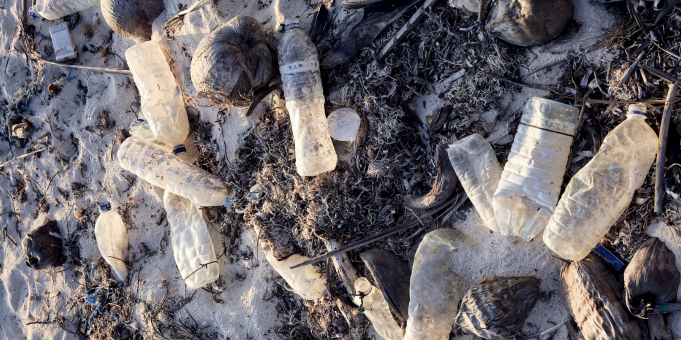- Each year, the average American ingests more than 70,000 microplastics in their drinking water supply. [4] These plastics originate from multiple sources, but are mostly linked to littering, stormwater runoff, and poor wastewater management in treatment facilities.
- The US passed the Microbead-Free Waters Act of 2015, which banned plastic microbeads in cosmetics and personal care products sold in the United States. [5] Critically, there are no regulatory limits on the levels of microplastics in bottled water.[6]
- The United States Environmental Protection Agency (EPA) proposed a National Strategy to Prevent Plastic Pollution on Earth Day 2023, addressing microplastic interventions to proactively prevent fibers from entering drinking water sources. [7]
- A single fleece jacket sheds up to 250,000 microfibers during a single wash. In the transport from the washing machine into drinking water, “microfiber captures” are being developed by entrepreneurs to prevent fibers from clogging filters and jeopardizing urban water treatment infrastructure. [8]
- Microfibers from synthetic fibers have been shown to make up the majority of human material found along the world’s shorelines, accounting for up to as much as 85%.[9]
- Microplastics can also come from car tires. Plastic dust is created by the friction between the wheels and the road and is blown into waterways and inhaled by humans. Car tires shed 20 grams of plastic dust every 100 kilometers. [10]
- Biologically-active slow sand filters, which are utilized in some water treatment plants for decontamination purposes, have shown a 99.9% efficiency in removing microplastics from drinking water. [11]
- According to a 2020 study conducted by PEW Trusts, annual flows of plastic into the ocean could be reduced by 80% by 2040 through the application of existing approaches to reduce our consumption of single-use plastics and the adoption of eco-friendly alternatives. [12]
To learn more about the threat and impact of plastic pollution and get tips to reduce your plastic consumption, download EARTHDAY.org’s Plastic Pollution Primer and Toolkit.



Recently on Twitter